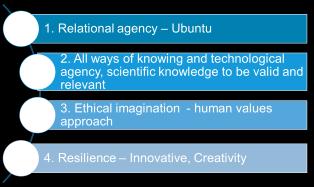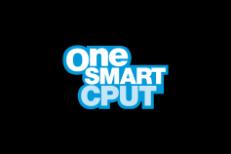Centre for Community Engagement & Work Integrated Learning





The Cape Peninsula University of Technology (CPUT) is a vibrant, multi-campus institution with more than 30,000 students across its six faculties. The only University of Technology in the Western Cape, CPUT strives to position itself strategically to offer sound academic programs and relevant research opportunities are responsive to the needs of the Western Cape, our country, and the world.
With research at the core of our education business, CPUT is buoyed by the support of our committed researchers and quality academic staff, and local and international research partners. CPUT is geared toward relevant, proactive research that will benefit all of society well beyond the Fifth Industrial Revolution.
The Institution’s new Strategic Plan, Vision 2030 is premised on the idea that “Smartness” must be embedded into every operational aspect of our work. At CPUT, our mission is to transform our students, “through world-class researchers who inspire knowledge production and innovation that is cutting edge”.
Through the innovative system of work-integrated learning, our students have the added advantage of simultaneously learning and working in their chosen fields. CPUT graduates are holistic individuals who are equipped to enter the world of work, confident in the skills, knowledge, and values they take with them on their future journeys.
Throughout the COVID-19 pandemic, CPUT has shown courage in the face of the unknown, embracing the changes that accompanied this unprecedented time, and confronting challenges head-on. With the pandemic likely to be with us for the foreseeable future, we remain committed to staying the course, fostering innovation, bridging the digital divide, and creating a better-equipped humanity – and ultimately achieving our goal of being “One Smart CPUT”. Having embarked on this transformative era, we have set in motion our vision of being, “Africa’s leading the Smart University of Technology, globally renowned for innovation, with graduates that shape a better world for humanity
Copyright, Cape Peninsula University of Technology
We are a university in Cape Town, South Africa and the only university of technology in the Western Cape province. We are also the largest university in the province

Dumisani Xesha
Officer: Seta Projects
Manager: Co-Operative Education
Director: Community Engagement and Work Integrated Learning
Manager: Service-Learning and Civic Engagement
Administrator: Graduate Recruitment
Administrator: CoOperative Education
Admin Assistant: Community & Civic Engagement
Theresa Burns
Administrator: ServiceLearning
Admin Assistant: Co-Operative Education
Copyright, Cape Peninsula University of Technology. We are a university in Cape Town, South Africa and the only university of technology in the Western Cape province. We are also the largest university in the province.
Tobe a Centre of Excellence workingsmartly with industry and community, locally and globally, to provide cooperative education and community engagement opportunities for students to meet the challenges in this fastchanging world.
1. To provide strategic direction and leadership for community and industry engagements with the university and quintuple helix partners regionally, nationally, and internationally in promoting graduate employability and grant systems.
2. To re-imagine the Work Integrated Learning framework through appropriate curriculum development, research, and quality assurance.
3. To contribute to a sustainable economy and cohesive community in South Africa, the African continent and beyond; the Centre seeks to instil values, graduate attributes, employability, entrepreneurship, and social responsiveness in students, through staff and student development and research initiatives.
Copyright, Cape Peninsula University of Technology We are a university in Cape Town, South Africa and the only university of technology in the Western Cape province. We are also the largest university in the province





Service-Learning is a course-based, credit-bearing experience in which students participate in an organized service activity that meets identified community needs and reflects on the service activity in such a way as to get a further understanding of course content, a broader appreciation of the discipline, and an enhanced sense of civic responsibility (Bringle and Hatcher, 1995).

The role of the SL Unit is to coordinate SL projects and assist academics from all faculties and campuses to integrate community service into mainstream academic programs and research. Another role of the SL Unit is to nurture and develop mutually beneficial partnerships between communities, higher education institutions and the service sector. The unit also provides academics with the resources, materials and guidance in the planning, implementation, assessment, and evaluation of SL projects.
The SL project or program is divided into three main phases: The Planning Phase, The Implementation Phase and the Evaluation Phase. The activities which are linked to these phases are as follows:
• Registration of the SL project
• Design SL curriculum
• Establish mutually beneficial partnerships
• Manage Risk for students
• Compile site visit schedules
• Plan a budget and explore funding
• Plan project assistance (lectures, community site mentors, group leaders, etc.)

• Distribution of educational materials
• Students implement on community sites
• Students are monitored on site
• Assessment of students’ projects
Copyright, Cape Peninsula University of Technology
We are a university in Cape Town, South Africa and the only university of technology in the Western Cape province. We are also the largest university in the province

• Partners reflect on the project
• Project is evaluated and the project is revised
• Reports are compiled and submitted
• Research opportunities are explored
Although the project activities are allocated to three respective phases, some activities can overlap depending on the nature of the project and the agreement between partners.
Service-Learning has a triad partnership model that consists of CPUT staff and students, Community Partners and Service Providers (government departments and agencies). These partnerships are based on mutual trust, respect and a culture of sharing resources, skill and knowledge. Collaborative conceptualization of projects involves consultations with all partners throughout the project phases. The purpose of tripartite partnerships for SL is to foster:
• Community Empowerment and development
• Transformation of the higher education system to community needs Service delivery to previously disadvantaged communities (JET, 1999, in Lazarus, 2001 Partnerships are also developed between corporate and large community organizations in cases where additional funding is required.
Service-Learning projects aim to be beneficial to all the parties involved, namely community partners, service providers and students.
• Students learn to apply principles from the module/course to new situations. This means that students are provided with a learning synergy that enables them to value academic learning along with community-based experiential learning.
• Their sense of social responsibility and commitment to the greater good is advanced.
• Students are provided with opportunities for active learning and problem-solving through participation in the community (Howard, 1998: 23-24).
• Service-Learning allows lecturers to approach their curriculum creatively and in a way which can benefit both students and the broader society.
• The role of the academic staff in the classroom is expanded from a provider of knowledge
Copyright, Cape Peninsula University of Technology
We are a university in Cape Town, South Africa and the only university of technology in the Western Cape province. We are also the largest university in the province
to a facilitator of critical synthesis and learning.
• Lecturers are provided with opportunities for collaborative research on community development with internal and external partners.
Benefits for community and service partners
• Community development is enhanced through staff and student involvement and students become more invested in the community.
• The community builds links with the HEI and gets increased access to institutional resources.

• The quality and efficiency of services offered to the community increase as the community and service agencies receive an infusion of creativity and enthusiasm from students.
Whom to contact:
Ms Jacqueline Scheepers
Manager: Service-Learning and Civic Engagement
Tel: +27 21 959 6869
Email: scheepersj@cput.ac.zaMs Theresa Burns Tel. +27 21 959 6868
E-mail: burnst@cput.ac.za
Copyright, Cape Peninsula University of Technology
We are a university in Cape Town, South Africa and the only university of technology in the Western Cape province. We are also the largest university in the province
The concept of civic engagement at CPUT encompasses voluntary and community-based activities that operate independently of the learning outcomes of academic programs. As these activities are NOT integrated into the mainstream curriculum students are not awarded marks for their participation. This makes these activities different from service learning

The main role of the Civic Engagement Unit is to provide a holistic institutional picture of noncurricular community-based activities carried out by both staff and students at the Cape Peninsula University of Technology. The unit also provides support for the initiation of
• non-curricular activities by students through facilitating partnerships with NGOs,
• departments, the private sector and communities.
Civic engagement provides non-curricular opportunities for administrative staff, student societies/clubs and academic staff and allows them to contribute to socio-economic development through a wide range of activities. It prepares students for good citizenship by raising awareness of the need for social responsibility and commitment to building South Africa’s future economically, politically and socially.
Civic engagement aims at developing students and staff with the following attributes:
• Intellectual Imagination: Ability to see the unseen, challenge the status quo and suggest that things could be done differently.
• Personal Initiative: Making things happen and celebrating the satisfaction of bringing new things into being, independent, proactive and self-starting
• Spirit of Selflessness, passion and integrity: Recognition that ultimate personal satisfaction comes from empowering oneself so that one may serve others.
• Courageous Commitment: The courage and dedication to continue, realizing that applying consistent commitment has a way of overcoming.
With these attributes, civic engagement aims at capital development that includes a combination of human, entrepreneurial and social capital.
Copyright, Cape Peninsula University of Technology
We are a university in Cape Town, South Africa and the only university of technology in the Western Cape province. We are also the largest university in the province
Objective 7.1: Build the capacity of students to engage in a CPUT student experience in ways that are both individually transformative and that build the social capital of CPUT and its broader community
Objective 7.2: Embed a suite of comprehensive and quality services for students that are integrated, responsive and focused on supporting students’ holistic well-being, and academic success and supported by smart technologies
Objective 7.3: Support a dynamic student community through the provision of high-quality learning and social environments and experiences
Objective 7.4: Facilitate rewarding and high-impact experiences that enrich and extend students’ program of study/academic journey, including leadership, international exposure through smart technologies, work-based learning and civic engagement
Objective 7.5: Encourage and strengthen the partnership between students and the University through constructive smart conversations, co-creation and celebration
Objective 7.6: Engaging students in their learning
Objective 7.7: Implementing a relevant, transformative high impact co-curricular program aimed at the holistic development of smart graduates, employees and citizens
Objective 7.8: Building strong alumni from day 1
Objective 7.9: Recognizing the student’s voice and providing the platform for critical intellectual engagement/Encouraging difficult and even uncomfortable discussions on campus
Whom to Contact
Ms Jacqueline Scheepers
Tel: 021 959 6869 Email: scheepersj@cput.ac.za
Copyright, Cape Peninsula University of Technology
We are a university in Cape Town, South Africa and the only university of technology in the Western Cape province. We are also the largest university in the province

The Service-Learning Unit has been inundated with project applications from across the six faculties. This serves as an indication that Service-Learning is becoming popular and recognized as a useful pedagogical tool for authentic learning experiences. A natural alignment exists between the achievement of graduate attributes and Service-Learning. Staff are encouraged to be mindful of the incorporation of these attributes when designing their Service-Learning programs. All requested documentation related to projects is required in preparation for the quality audits.
The Service-Learning projects are approved by the Community Engagement and Work Integrated Learning Faculty Coordinators and registered with the Service-Learning Unit as per the spreadsheet below
Copyright, Cape Peninsula University of Technology We are a university in Cape Town, South Africa and the only university of technology in the Western Cape province. We are also the largest university in the province


CPUT has a long history of managing the 2nd Chance Matric Rewrite project since 2015. The 2nd Chance project aims to provide learners with an opportunity to improve their results in selected subjects and to prepare learners to meet the requirements for study at a higher education institution. In addition, the project strives to provide experiential learning opportunities for CPUT students in their subject fields and other areas of professional and personal development. Tuition is offered in Mathematics, Mathematical Literacy, Physical Sciences, Life Sciences, English First Additional Language and Accountancy. The project creates experiential learning opportunities for ServiceLearning and Civic Engagement projects across the university and is considered one of the projects of the VC’s Prestigious STEM initiative. CPUT is granted an annual concession by the Department of Basic Education (DBE) and UMALUSI, Council for Quality Assurance in General and Further Education and Training, to be registered as an examination centre for the National Senior Certificate (NSC) examination. The SLCE Unit registers approximately 250 learners annually with the Department of Basic Education (DBE) to rewrite the NSC at Belvue Primary School in Belhar. With the support of the Western Cape Education Department (WCED), the school Principal, Mr Andy Josephus, and the school governing body the project can provide on-site supervision and examination management in line with the guidelines as set by the WCED.
Copyright, Cape Peninsula University of Technology We are a university in Cape Town, South Africa and the only university of technology in the Western Cape province. We are also the largest university in the province
The leadership academy is linked to Vision 2030 Focus area 2: Smart teaching and Learning, and smart learning environments; 3: Enable RTIP relevant, equitable and excellent trans-disciplinary knowledge production; 6: Smart engagement and strong links with quintuple helix partners; and 7: ONE SMART CPUT student engaged and sustainable learning. The programme promotes the integration of teaching and learning; research and community engagement and is aimed at developing the whole student in a trans-disciplinary context.
The academy is led by Ms Jacqui Scheepers, Manager of Service-Learning and Civic Engagement and student projects are coordinated by Lovetta Bolters. Facilitators on the student leadership academy include academic staff, support units and student academy alumni as follows: Mr Nicholas Pinfold, Chef Lufuno Sinthumule, Ms Elisabet Smit, Mr Lloyd Christopher, Dr Faiq Waghid, Mr Stephen Harrison, Mr Phillip Chibvuri, Mr Calvin Maseko, Ms Janine van Sitter, Ms Lovetta Bolters, Ms Charlene Petersen, Ms Laura Pinfold, Mr Gabieb Hendricks, Ms Tasleema Mohamed, Ms Toni Stringer, Mr Walter Kohlhofer, Mr Desmond Jackson, Ms Jacqui Scheepers, Chef Samantha Linden, Chef Bryony M Ackay, Heidi Janse Van Rensburg, Chef Portia, Chef Asithandile Ndamase, Chef Nathene Samuels, Regina Beukes, Bongani Tyhali, and Chef Unathi Ngalonkulu, Regina Davids
The main purpose of the Student Leadership Academy is to develop a student capacity-building program to further the leadership skills of students, specifically in preparation for Civic Engagement projects that are linked to the university Graduate Attributes. This academy further seeks to promote the positive youth development approach which focuses on “making young individuals stronger and more resourceful, as reflected in their behaviour and mindset” (UN, 2016: p18). The program includes institutional engagement, national engagement on best practices, development of a student leaders’ program, community engagement projects, and includes a student youth conference for across disciplines and projects. At its foundation is the United Nations World Youth Report (2016) and the philosophy of Ubuntu as a global concept. The academy builds on the notion of servant leadership and citizenship which is critical for developing a healthy society. There are five key characteristics linked to positive youth development which are: Competence, Confidence, Character, Connection and Caring (United Nations, 2016). In the report by (Dolan, P. & Brennan, M. 2016) civic engagement is not a neutral concept and: Þ encompasses a variety of forms and perspectives surrounding relationships between the individual, the community and broader society.
Þ Involves various discourses and viewpoints that carry particular messages and reflect differences in understanding the purpose and nature of youth as citizens; and Þ Requires a need to examine how particular forms of civic engagement relate to the experiences and social positioning of young people and what the objectives are. The academy is interdisciplinary and intercultural and is linked to local, regional and national priorities and the United Nations Sustainable Development Goals. Critical to the academy is the achievement of Graduate Attributes and the third pillar of higher education, Community
Copyright, Cape Peninsula University of Technology We are a university in Cape Town, South Africa and the only university of technology in the Western Cape province. We are also the largest university in the province

Engagement. The Ubuntu philosophy is the conceptual framework which underpins this programme and appears in the institutional strategic Vision 2030 which promotes SMART engagement through its various focus areas and projects
Copyright, Cape Peninsula University of Technology We are a university in Cape Town, South Africa and the only university of technology in the Western Cape province. We are also the largest university in the province

The SL&CE Units are actively involved in supporting and encouraging university staff to develop their projects into tangible research outputs. Theoretical and philosophical concepts are introduced to students to enhance the scholarship of engagement. Students are encouraged to pursue further studies.
Scholarship in SLCE is built on the following principles as outlined by Boyer (1990):
◦
The scholarship of discovery: Closely resembles the notion of research and contributes to the total stock of human knowledge.
◦
The scholarship of integration: Underscores need for scholars to give meaning to their discovery by putting it in perspective and interpreting it about other discoveries and forms of knowledge.
◦
The scholarship of application: Theory leads to practice and practice leads to theory Community engagement is viewed apractisedced as a scholarly activitand activity and context for dialogue between theory and practice through reflection.

◦
The scholarship of teaching: Within the framework of a scholarship of engagement, the traditional roles of teacher and learner become blurred. What emerges is a learning community including community members, students, academic staff and service providers.
The Department of Science and Technology has launched a framework which promotes the consideration of engaged scholarship for community engagement. Service-Learning and Civic Engagement Units consider this framework as an ideal vehicle to promote a more scholarly approach to community engagement.
Copyright, Cape Peninsula University of Technology
We are a university in Cape Town, South Africa and the only university of technology in the Western Cape province. We are also the largest university in the province
International partnerships include collaboration with international universities and networks to promote the implementation of SLCE at CPUT. These programs are implemented virtually and using various online platforms. The units provide access to international and intercultural contexts for students and staff such as:
• Ubuntu Global Network: A global ubuntu network
• Talloires Network of Engaged Universities

• HAN university community engagement projects
Copyright, Cape Peninsula University of Technology We are a university in Cape Town, South Africa and the only university of technology in the Western Cape province. We are also the largest university in the province



Co-operative Education is a philosophy of learning that is based on a partnership between the institution and its external stakeholders (industry) whereby the common objective is to provide the student with an enhanced learning experience in a workplace.
In essence, this is a three-way partnership in which the students alternate academic study with periods of work experience, during which they apply their learning in real-life situations under the supervision of experienced mentors in the workplace as well as the guidance of academic staff from the institution. The work that is covered during this period is monitored and assessed according to requirements set out by specific departments. This type of learning is called experiential learning.
The role of the Co-operative Education Unit
• Establishing strategic partnerships that result in the creation of experiential learning opportunities for students in the workplace. We collaborate with employers, youth organizations, national and international bodies, and all other interested stakeholders on matters relating to student employment.
• Ensuring that the Co-operative Education policy is implemented appropriately across the institution
• Ensuring that matters that affect the function of cooperative education and experiential learning, institutionally, are addressed
• Managing information about cooperative education
• Marketing (in collaboration with Marketing and Communication) the experiential learning program

How does the experiential learning program work?

• Partnerships are created between the institution and the industry
• Workstations are sourced through discussions between relevant institution representatives and industry representatives These discussions centre around the ability of specific workstations to meet the training requirements as specified in learner guide documents for specific programs
• Recruitment processes are initiated by the industry player in cooperation with a staff member from the institution. Where needed, interview facilities are made available on campus.
• During the time that the students are with the organization, they are treated as regular employees or employees in training. They are required to record their progress in logbooks that are signed by their supervisors or mentors, as well as submit regular assignments,
Copyright, Cape Peninsula University of Technology
We are a university in Cape Town, South Africa and the only university of technology in the Western Cape province. We are also the largest university in the province
projects, etc. to the Co-op Coordinator as they learn to integrate their learning with the actual work
• Co-op Coordinators also visit them to monitor and assess their progress
• Periods of placement vary from 3 to 12 months depending on the requirements of specific programs.

Benefits of a Co-operative Education Partnership for employers
• Periods of integrating learning and work equip the student with pre-qualification experience, thus enabling employers the opportunity to recruit work-ready graduates
• Students who respond well to the work environment can be retained as full-time employees on completion of their training periods
• Each discipline has an Advisory Committee. Employers of our students have the opportunity to be members of these committees which communicate the needs of the industry to the institution. Through membership in these committees, the industry helps to shape the training that the students receive at the institution
Benefits of a Co-operative Education Partnership for students
• This is the student’s opportunity to integrate their learning with real-life work situations.
• During this period, students have an opportunity to demonstrate their abilities to potential future employers
• Presented with challenging tasks, students can develop to their highest potential
• Work experience is often the determining factor in whether or not new graduates find employment. CPUT students, through Co-operative Education, often have work experience after their academic studies
Copyright, Cape Peninsula University of Technology
We are a university in Cape Town, South Africa and the only university of technology in the Western Cape province. We are also the largest university in the province











Copyright, Cape Peninsula University of Technology We are a university in Cape Town, South Africa and the only university of technology in the Western Cape province. We are also the largest university in the province








Copyright, Cape Peninsula University of Technology
We are a university in Cape Town, South Africa and the only university of technology in the Western Cape province. We are also the largest university in the province
The Graduate Recruitment Program (GRP) is a voluntary program that runs throughout the year. Recent CPUT graduates who have graduated in the last two years can submit their CVs for employment opportunities. These opportunities could include part-time and full-time employment as well as internships.
CPUT has not hosted a Career Fair for the past few years due to various reasons. CPUT along with other Higher Education institutions are affiliate members of the South African Graduate Employers’ Association (SAGEA). In 2021 and 2022, SAGEA hosted VirtualGradExpos which our students and graduates were invited to participate at no cost.

The submission of CVs is still manually processed and saved by 1 staff member - a Graduate Recruitment Administrator (GRA) as there is no automated Career Portal. This is a huge challenge for the growth of the program. CVs are kept for 3 months after which the graduate should inform the GRA whether they have found employment or resubmit their CV for a further 3 months if still unemployed. The reason for this is to avoid forwarding outdated CVs to organizations as many graduates find employment and do not inform the office accordingly.
The GRA is currently liaising with unplaced IT WIL students who are developing a Graduate Recruitment Online System for CV submissions (as their WIL project). This is a project and will only be completed towards the end of the WIL period in December 2022.
The institution is currently in the process of looking at acquiring an automated data management system for WIL and graduates.
The GRA manually forwards CVs to organizations as per request from the organization for full-time and part-time employment as well as internships.
Copyright, Cape Peninsula University of Technology We are a university in Cape Town, South Africa and the only university of technology in the Western Cape province. We are also the largest university in the province
The GRA posts adverts for employment opportunities on the Graduate Recruitment Facebook page and also forwards them (where applicable) to Marketing & Communications Department for posting on the Student Affairs social media pages.
Depending on the advert, this is also sometimes forwarded to the relevant Faculty for distribution to interested students.
As a result of one of the adverts posted, one of CPUT’s HR graduates has made it to the DHL Gradstar Top 100 Employable students and will be going to the finals on 1 December for the Top 10 Employable students.
This service needs to be re-imagined in the format of hosting Career Fairs and Company presentations as more cooperation is needed from the faculties to make them a success. In October, CPUT engaged with Schlumberger: Angola, Central and East Africa and was interested in recruiting Engineering graduates from those regions. We also hosted Schlumberger for their recruitment presentations and aptitude tests.
Summary of 2022 Graduate
as of 25 November 2022
Description Total
No. of adverts posted 271 CV requests forwarded to organizations 96 Total no. of CVs received 316
Copyright, Cape Peninsula University of Technology We are a university in Cape Town, South Africa and the only university of technology in the Western Cape province. We are also the largest university in the province

COURSE NO. OF CVs
Accounting 25 Analytical Chemistry 3 Biotechnology 2 Building/Construction Management/Quantity Surveying 3
Chemical Engineering 10
Civil Engineering 34 Clothing Management 1 Consumer Science: Food & Nutrition 2 Cost & Management Accounting 2 Education 1 Electrical Engineering 99 Entrepreneurship 3 Events Management 6 Financial Information Systems 2 Food Technology 1 Graphic Design 2 Horticulture 4
Human Resource Management 18 Industrial Engineering 17 Information Technology / Information & Communication Technology 6
Internal Auditing 7

Management 2 Marketing 4
Mathematical Sciences 2 Mechanical Engineering 7 Office Management & Technology / Business & Information Admin. 8
Copyright, Cape Peninsula University of Technology We are a university in Cape Town, South Africa and the only university of technology in the Western Cape province. We are also the largest university in the province
Operations Management 10
Paralegal Studies 6
Public Management 2
Public Relations Management 1
Real Estate & Facilities Management 4

Sport & Leisure Management 3
Tourism Management 17 Town & Regional Planning 1 Visual Communications Design 1
TOTAL 316
Copyright, Cape Peninsula University of Technology We are a university in Cape Town, South Africa and the only university of technology in the Western Cape province. We are also the largest university in the province

Funded I placement projects are vital to the university’s efforts to achieve the set goals for vision 2030. Implementation of these projects offers a suitable vehicle for the centre in its attempts to contribute to the achievement of the institutional vision. The projects provide the following advantages for the institution:
• Increased number of WIL placements
• Improved management of WIL in the institution
• Improved quality of relations with stakeholders in our quintuple helix environments
• Improved marketing of the institution
The past year saw 582 WIL students benefiting from their placement. The awarded funding totalled R15 358 500 which targeted five faculties, namely: Health and Wellness, Business and Management Sciences, Applied Sciences, Informatics and Design, and Engineering. The table below provides details of the funders who contributed, the grant total, the faculties which received benefits, the number of student beneficiaries and the stipend for each beneficiary.
Copyright, Cape Peninsula University of Technology We are a university in Cape Town, South Africa and the only university of technology in the Western Cape province. We are also the largest university in the province
CHIETA R680 000 Health and Wellness Biomedical Sciences
Applied Science Analytical Chemistry
MERSETA R3 849 000 Engineering Mechanical Engineering Electrical Engineering Industrial Engineering
BANKSETA R3 593 205 Informatics and Design Information Technology

MICT SETA R420 000 Business Public Management
CATHSSETA (Graduates) R672 000 Business Tourism and Events Management
40 R3500
59 R5000
105 R5500
60 R3800
10 R5000
Copyright, Cape Peninsula University of Technology
We are a university in Cape Town, South Africa and the only university of technology in the Western Cape province. We are also the largest university in the province

The Centre participates in a national graduate project which emanated from the Presidential Youth Employment Stimulus fund, an initiative by the president’s office which was announced in 2021. At the beginning of 2022, the DHET invited universities to indicate their capacity to host interns for six months to provide exposure to the university environment. The interns were earmarked to assist in operations and academic activities for the experience. A total of 3000 opportunities were availed, and CPUT has committed 70 beneficiaries to the project.
Presidential Youth Stimulus Project
R2 100 000 18 Departments of the university 70 graduates 5000
Copyright, Cape Peninsula University of Technology We are a university in Cape Town, South Africa and the only university of technology in the Western Cape province. We are also the largest university in the province

WIL Africa, SASCE Conference held in East London in Sept 2022. Attended by over 20 CPUT staff. Prof R Balkaran, DVC Teaching and Learning, CPUT was the invited Plenary Speaker for the Opening of the Conference.
Presented paper on WIL and Graduate Employment Virtual Summit in Nov. 2022. Topic : Preparing future proof curricula to boost the economy and contribute to social cohesion in the Western Cape, South Africa.
Prof Lalini Reddy attended the THENSA/HERESA/EU Study Visit to KTH Institute of Technology, Stockholm, Sweden in Oct. 2022.
1. Padayachee, B., Odun-Ayo, F. and Reddy, L., (2021). Apoptotic effect of Bulbine Natalensis and Chlorophytum Comosum in myelogenous Leukemia K562 cell line. Brazilian Journal of Biology, 84. https://doi.org/10.1590/1519-6984.251336. Published by Instituto Internacional de Ecologia. ISSN 1519-6984 (IF- 1.651; Q2).
2. Odun-Ayo, F. and Reddy, L., (2021). Potential Roles of Modified Pectin Targeting Galectin-3 against Severe Acute Respiratory Syndrome Coronavirus-2. J, 4(4), pp.824-837. https://doi.org/10.3390/j4040056. Published by Multidisciplinary Digital Publishing Institute (MDPI). ISSN 2571-8800
3. Vakele, Y., Odun-Ayo, F. and Reddy, L., (2022). In vitro antioxidant and cytotoxicity activities of selected indigenous South African medicinal plants. African Health Sciences, 22(1), pp.395403. DOI: 10.4314/ahs.v22i1.48. Published by Makerere University, Medical School. ISSN: 1680-6905. (IF- 1.06; Q2).
4. Odun-Ayo, F., Reddy, L., and Chetty K (2022). Determination of the ursolic and oleanolic acids content with the antioxidant capacity in apple peel extract of various cultivars. Brazilian Journal of Biology. 84, 1-7. Published by Instituto Internacional de Ecologia (IF- 1.651; Q2).
5. Odun-Ayo, F. and Reddy, L., (2022). Gastrointestinal microbiota dysbiosis associated with SARS-CoV-2 infection in colorectal cancer: the implication of probiotics. Gastroenterology Insights, 13(1), pp.35-59. https://doi.org/10.3390/gastroent13010006. Published by Multidisciplinary Digital Publishing Institute (MDPI). EISSN 2036-7422 (IF- 0.75; Q4).
Copyright, Cape Peninsula University of Technology
We are a university in Cape Town, South Africa and the only university of technology in the Western Cape province. We are also the largest university in the province
CPUT VC Industry Event organized by Office of VC and Centre for CE and WIL. This occurred on 20 June 2022. It was a successful hybrid event.
Copyright, Cape Peninsula University of Technology We are a university in Cape Town, South Africa and the only university of technology in the Western Cape province. We are also the largest university in the province


WIL Research Staff Workshops held with visiting professor from University of Massachusetts during Aug. 2022. Hosted by Prof Iman Chahine. MOU in process for future work.
Copyright, Cape Peninsula University of Technology
We are a university in Cape Town, South Africa and the only university of technology in the Western Cape province. We are also the largest university in the province
The Council and Management of the Cape Peninsula University of Technology are guided by the Strategic Plan 2030 Vision, Mission, and Core Values:


CPUT is Africa’s leading the Smart University of Technology, globally renowned for innovation, with graduates that shape a better world for humanity.
CPUT transforms its students, through world-class researchers who inspire knowledge production and innovation that is cutting edge.
CPUT agrees to Oneness and Smartness by:
• Embracing a culture of ethics and integrity.
• Seeking kindness and showing compassion to all staff, students and stakeholders of CPUT.
• Embracing restoration and addressing any issues of discrimination.
• Embracing unity and diversity.
• Showing passion and always searching for better ways of doing things.
• Taking accountability and accepting responsibility; and
• Being technologically astute.